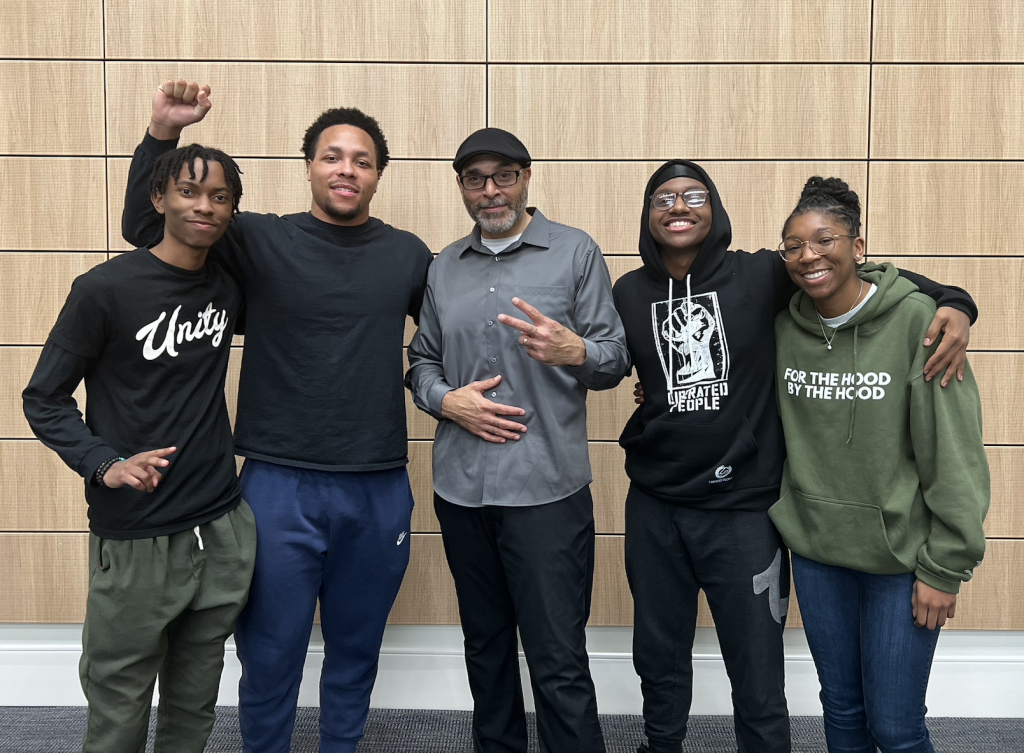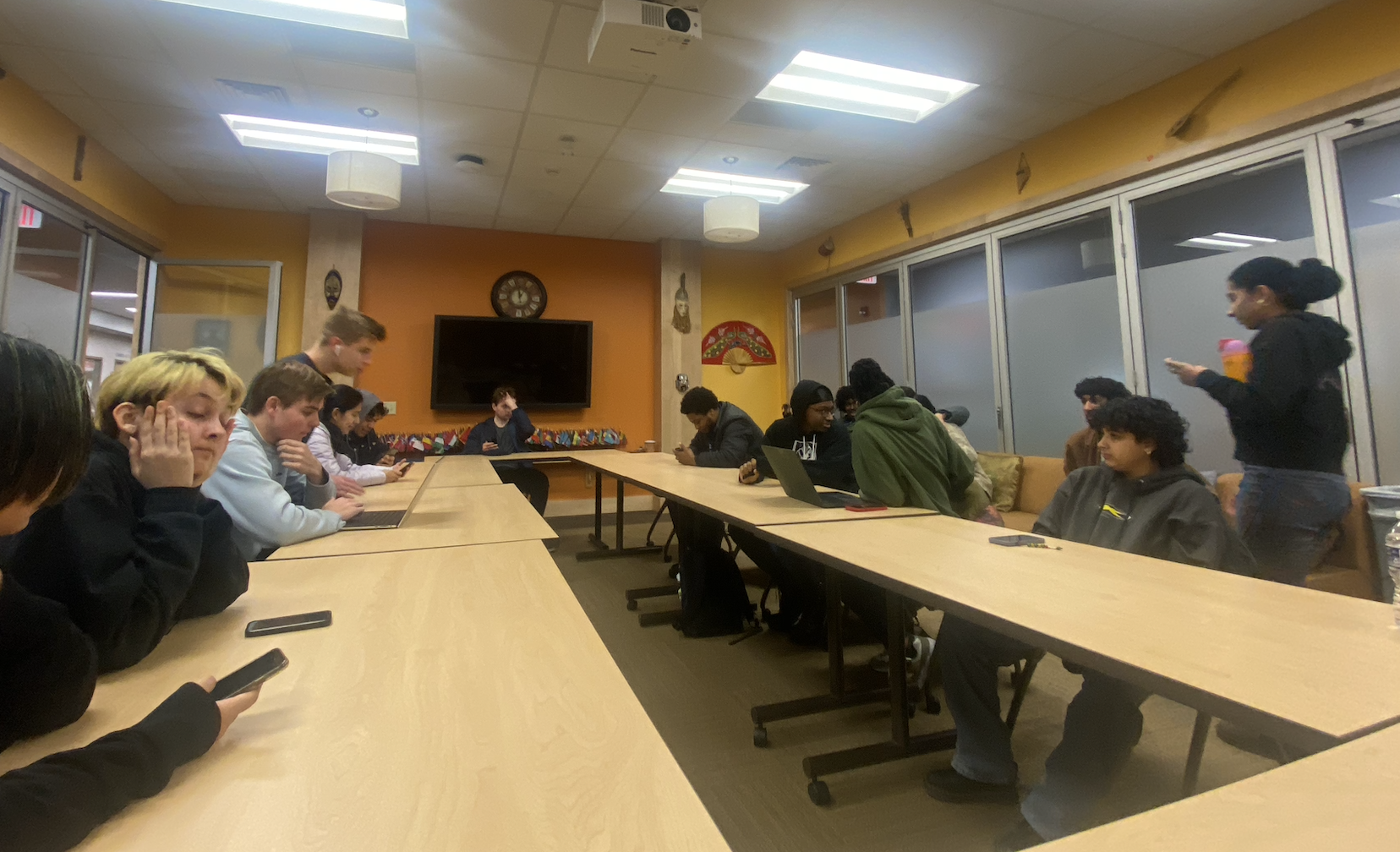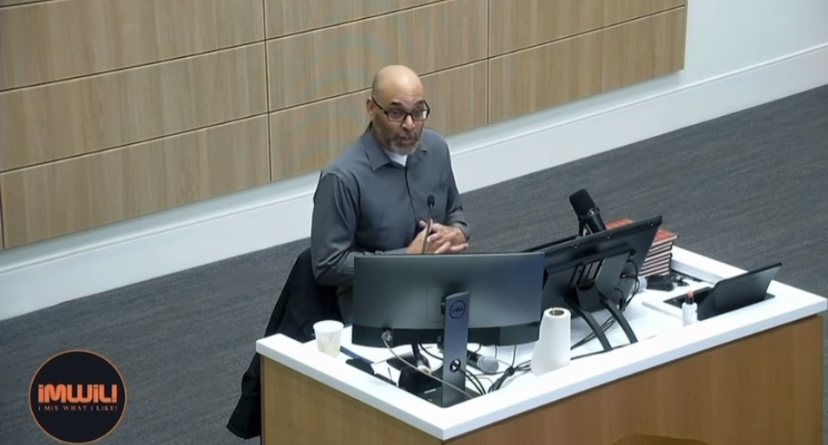Written by Ninah Jackson and Ryleigh Roberts
“Imagine, if you will, that in hopes of making your way to some not-so-far-off destination, you board a flight and find yourself lucky enough to get bumped up to first class. You sit down, settle in, unfurl your body in preparation for takeoff, and come to realize that you’re nestled between Killer Mike, Amy Schumer, and Ava DuVernay.”
–Dr. Jared Ball, (Paraphrased) Opening Statement for MLK Week Lecture
This was the framing of Dr. Jared Ball’s narrative-style lecture titled “King and the Terror of Revolution” – the final program of Bucknell’s two-week annual reflection and commemoration of the life and legacy of Reverend Dr. Martin Luther King Jr. Over the course of 30 minutes, Dr. Ball – a Professor of Communication and Africana Studies at Morgan State University in Baltimore, Maryland, host of the podcast “iMiXWHATiLiKE!”, and co-founder of Black Power Media – built out this fictitious exchange, regaling the audience with tales of eye-rolls, spit takes, and a guest appearance from Michael Rapaport.
The heart of Dr. Ball’s story, however, was his deconstruction of various myths, misconceptions, and, in some cases, outright lies that are popularly circulated about Martin Luther King Jr. In the heat of his (fictitious) exchange with Killer Mike – an American rap artist from Atlanta, Georgia, and self-avowed Black capitalist – Dr. Ball counters Killer Mike’s attempt to lay claim to the legacy of MLK by pointing out that Dr. King himself disidentified as a capitalist. To this point, Dr. Ball cites a 1968 exchange between Andrew Young – former U. S. Congressman and Ambassador to the United Nations – and Dr. King, as documented by the book Prophets of Discontent: Martin Luther King Jr. and the Critique of Racial Capitalism by Jared A. Loggins and Andrew J. Douglas.
As Belafonte recalls of the conversation that evening, it was Andrew Young—the future U. S. Congressman and Ambassador to the United Nations—who unwittingly ratcheted up King’s anger. “I don’t know, Martin,” Young said. “It’s not the entire system. It’s only part of it, and I think we can fix that.” King was having none of it. “I don’t need to hear from you, Andy,” he clapped back. “You’re a capitalist, and I’m not. The trouble is that we live in a failed system. (Loggins & Douglas, 2)
Continuing along in his flight, Dr. Ball advances to the next hurdle of defending his claim that King is “the most known and least understood man since the historical Jesus.” His challenger? The award-winning filmmaker, screenwriter, film, and television producer Ava DuVernay is the creative mastermind behind the 2014 film Selma. Dr. Ball contends that films like Selma perhaps do more harm than good when clarifying the legacy of Martin Luther King Jr. and the Civil Rights Movement more broadly. “There’s reference to King,” Dr. Ball noted, “but not his actual radicalizing politics; not the fear he inspired in the federal government, the mainstream press, or his fellow mainstream civil rights leaders…the film Selma entirely erases [Kwame Ture].” Ball argues that “King was becoming a menace in the eyes of the state and its preferred liberal civil rights leadership.”
To complete his story, Dr. Ball draws a throughline between the present and the past by making mention of King’s own stance on Zionism, the state of Israel, and Palestinian liberation. He cites Black Power and Palestine: Transnational Countries of Color by Michael Fischbach, pointedly making mention of King’s belief that peace in the Middle East could not and cannot happen without Israel ending its occupation of Palestine. Dr. Ball concludes his lecture with continued commentary on the relationship between the U.S. media apparatus, the co-opted and woefully misunderstood legacy of Dr. King, and the deradicalization of the general American populace.

Earlier that day, Dr. Ball sat down with students for an informal lunch, answering questions about his personal philosophies and expanding in greater detail on the misconceptions surrounding Dr. Martin Luther King Jr. Crammed in a small room– made smaller by the crowd of students and professors who piled in to hear him speak– the event began with students sharing their k-12 educational experiences learning about Dr. King, many noting that their in-class discussions were often limited to Black History Month and painted an image of Dr. King that was nonviolent, peaceful, and in opposition to the more ‘radical’ Malcolm X.

These misconceptions, as Dr. Ball noted, cannot hold up to the facts– especially considering Dr. King was considered a threat to the government, who eventually orchestrated his assassination. He continued, explaining that the sources claiming the existence of a steep ideological divide or strife between the two figures were later proven to be false, saying that “the history of those two men and the politics that they dealt with were manipulated with the specific goal of creating this outcome.” After students shared their experiences, Dr. Ball explained the historical context likely responsible for their misleading and even outright false education on the two men, saying:
“If you read the counterintelligence program, which was created to destroy leftist movements, they had a version of that program targeting the black liberation movement where one goal was to ensure that black youth were not introduced to black nationalism and radical politics. They were wanting [people] to grow up not knowing what M.L.K and Malcolm X were advocating… they were slowly developing and constructing what really should be known as psychological warfare, but an aversion of men and their histories that is supposed to make your generation either not want to struggle or not understand what the struggle is or have no way of interpreting the world.”
Recognizing the potential hyperbolic nature of his claim, Dr. Ball encouraged students to educate themselves on the subject, saying, “I dare you not to take my word for it; I dare you to research what I’m saying. If you ever want to test your personhood and strength, really look at the detailed history of this country because it’s nothing like what you’ve been told.”
Speaking on his own journey to truth, Dr. Ball sourced much of his information from Martin Luther King Jr.’s last novel before his assassination, Where Do We Go From Here: Chaos or Community, saying that, upon completing it, “you start looking at the people who claim to be carrying on his legacy… and you realize ‘this is not real.’” In reference to MLK’s ideology, he explained that “he became an incredible critic of capitalism, white supremacy, black liberalism, the black bourgeoisie… yes, he was for peace, but he understood why younger militants were gravitating toward armed struggle and his critique for that was always couched in the notion that the government is the cause of that, quoting JFK saying ‘those who make peaceful revolution impossible make violent revolution inevitable’ and King was the one who was saying ‘nonviolence but direct action.’”
He continued, saying that, in the last years of his life, “King was hated by this country because he abandoned white liberalism and was increasingly becoming critical of the United States Government.” Dr. Ball recalled one of MLK’s last goals before his death was to start a movement where “the rents among those in the projects would be collected and used to rehabilitate those communities.” He paused, questioning why nobody focuses on that. Circling back, remembering his personal learning and unlearning process, said, “I just started reading [MLK’s] stuff and realized that I had been lied to for years.”
A student raised their hand, asking how the education system might mend these mistakes and what we can do moving forward. Dr. Ball explained that “we are in a civilizational crisis of methodology where we do not ask ourselves how we know what we know or why we like what we like… we have to be more clear about we are reaching our conclusions, and we who have the privilege to be in these educational spaces have to take advantage of that by reading what these figures were really saying, joining radical political organizations, and going from there.”
For the remainder of the talk, Dr. Ball answered more student questions, spoke on the current political environment, and advocated for individual efforts to learn and think for oneself.
